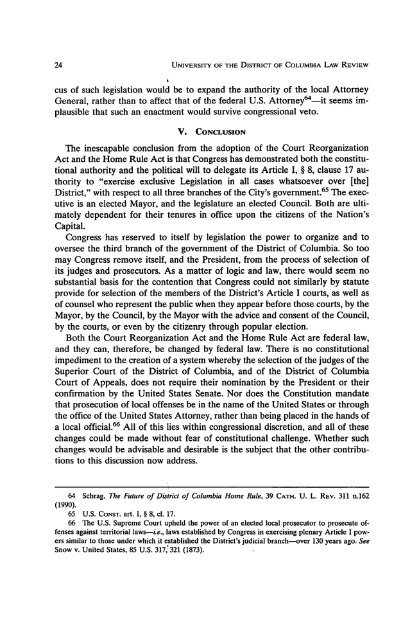Download Electronic Version - UDC Law Review
Download Electronic Version - UDC Law Review
Download Electronic Version - UDC Law Review
Create successful ePaper yourself
Turn your PDF publications into a flip-book with our unique Google optimized e-Paper software.
24 UNIVERSITY OF THE DISTRICf OF COLUMBIA LAW REVIEW<br />
cus of such legislation would be to expand the authority of the local Attorney<br />
General, rather than to affect that of the federal U.S. Attorney64-it seems implausible<br />
that such an enactment would survive congressional veto.<br />
V. CONCLUSION<br />
The inescapable conclusion from the adoption of the Court Reorganization<br />
Act and the Home Rule Act is that Congress has demonstrated both the constitutional<br />
authority and the political will to delegate its Article I, § 8, clause 17 authority<br />
to "exercise exclusive Legislation in all cases whatsoever over [the]<br />
District," with respect to all three branches of the City's government. 65 The executive<br />
is an elected Mayor, and the legislature an elected Council. Both are ultimately<br />
dependent for their tenures in office upon the citizens of the Nation's<br />
Capital.<br />
Congress has reserved to itself by legislation the power to organize and to<br />
oversee the third branch of the government of the District of Columbia. So too<br />
may Congress remove itself, and the President, from the process of selection of<br />
its judges and prosecutors. As a matter of logic and law, there would seem no<br />
substantial basis for the contention that Congress could not similarly by statute<br />
provide for selection of the members of the District's Article I courts, as well as<br />
of counsel who represent the public when they appear before those courts, by the<br />
Mayor, by the Council, by the Mayor with the advice and consent of the Council,<br />
by the courts, or even by the citizenry through popular election.<br />
Both the Court Reorganization Act and the Home Rule Act are federal law,<br />
and they can, therefore, be changed by federal law. There is no constitutional<br />
impediment to the creation of a system whereby the selection of the judges of the<br />
Superior Court of the District of Columbia, and of the District of Columbia<br />
Court of Appeals, does not require their nomination by the President or their<br />
confirmation by the United States Senate. Nor does the Constitution mandate<br />
that prosecution of local offenses be in the name of the United States or through<br />
the office of the United States Attorney, rather than being placed in the hands of<br />
a local official. 66 All of this lies within congressional discretion, and all of these<br />
changes could be made without fear of constitutional challenge. Whether such<br />
changes would be advisable and desirable is the subject that the other contributions<br />
to this discussion now address.<br />
64 Schrag, The Future of District of Columbia Home Rule, 39 CATH. U. L. REV. 311 n.162<br />
(1990).<br />
65 U.S. CONST. art. I, § 8, cl. 17.<br />
66 The U.S. Supreme Court upheld the power of an elected local prosecutor to prosecute offenses<br />
against territorial laws-i.e., laws established by Congress in exercising plenary Article I powers<br />
similar to those under which it established the District's judicial branch-over 130 years ago. See<br />
Snow v. United States, 85 U.S. 317,! 321 (1873).














